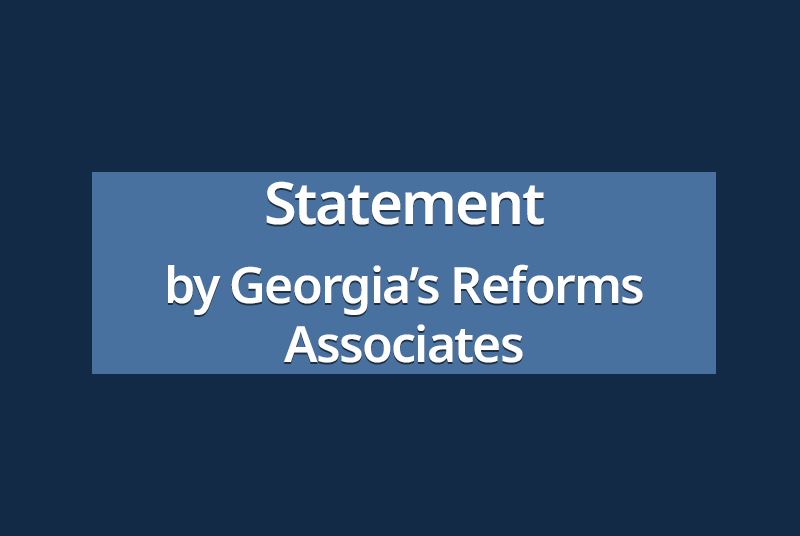GRASS Statement On Ukraine Supporting Resolution Adopted by the Parliament of Georgia

06 February, 2022
0
GRASS Statement On Ukraine Supporting Resolution Adopted by the Parliament of Georgia
Ukraine is currently in the spotlight of the international community. The civilised world stands together to counter and condemn the threat of a Russian invasion of Ukraine as well as the Kremlin’s hostile rhetoric vis-à-vis Ukraine, NATO and the West in general. The leaders of Georgia’s partner nations often emphasise that the ongoing crisis is not only about Ukraine and that Russia’s aggressive actions also pose a threat to the security architecture of all Europe, including of Georgia. Amidst the disconcerting passivity of Georgia’s executive government, a unified and principled position of the Parliament attracted even bigger international and domestic political significance.
The ruling party, which drafted the resolution, decided to pay no heed to the suggestions of the Parliamentary Opposition which among other things implied naming the aggressor – the Russian Federation – in Ukraine supporting the resolution and on 1 February 2021 adopted a one-party resolution “On Possible Military Escalation in Ukraine.”
It is deplorable that the Parliament of Georgia failed to adopt a unified, multipartisan and principled position on Russia’s aggressive actions against Ukraine and the current escalation. Instead of making the resolution a matter of broad support and public consensus, as also hoped by our Western partners, both parliamentary discussions and the adopted document in fact turned out to be a vivid illustration of a polarised society and national discord.
We believe that adoption of a non-partisan resolution would have been an important message for Ukraine and the international community to demonstrate Georgia’s solidarity with Ukraine as well as a principled and clear stance vis-à-vis Russia’s aggressive actions. Georgia’s Reforms Associates (GRASS) believes that the resolution adopted by the Georgian Dream does not respond to those challenges and threats which are currently displayed in the Russian Federation’s aggressive actions near Ukraine’s borders and which materialised in the violation of Georgia’s sovereignty and territorial integrity as early as in 2008.
First and foremost, of particular emphasis is that the resolution fails to mention Russia as a source of the threat which currently endangers peace and stable development not only in Ukraine but in Georgia and across the region as well.
Omitting the Russian Federation, as a chief actor behind escalation in the region, from the text of the resolution is also harmful for Georgia’s national interests, particularly in light of the security challenges which Georgia currently faces because of the Kremlin (creeping annexation, abduction of citizens, threat of annexation). In addition, the wording of the resolution’s text where clear stance vis-à-vis Russia’s actions is absent, significantly undermines Georgia’s positions on the international scene.
However, apart from refraining to name the Russian Federation as a source of the ongoing crisis, the resolution’s text is problematic for many other aspects as well:
- Unfortunately, the resolution does not clearly condemn the Kremlin’s demand to rescind the decision of the Bucharest NATO Summit in 2008 that Ukraine and Georgia will become NATO members.
- It has been years since Russia occupied Georgia’s (Abkhazia, Tskhinvali region) and Ukraine’s (Donbass, Luhansk) territories and annexed the Crimea Autonomous Republic. Russia’s aggression committed in the aforementioned territories, including arming the separatist movements, violates multiple norms of international law, including the inadmissibility of a forced change of internationally recognised borders and interference in domestic politics. Nevertheless, the resolution fails to mention Abkhazia and the Tskhinvali region as well as is muted in regard to the occupation of the Luhansk and Donbass regions and the annexation of Crimea.
- The resolution contains no calls for Russia to withdraw its occupation forces from those territories where they are deployed illegally and threaten peace and stability in the region.
- The resolution contains no calls for the Western partners to make even harsher sanctions on Russia imposed for crimes committed in Ukraine and Georgia.
- It is particularly baffling why the resolution makes reference to military escalation and war “in Ukraine” when it is clear for anyone that conflict arises because of Russia’s actions and is between Ukraine and Russia whilst military confrontation “in Ukraine” is the Kremlin’s narrative which seeks to create the false impression that the conflict is within Ukraine, against the breakaway regions at odds with the central government.
We believe that in light of the current situation, the adoption of the resolution “On Possible Military Escalation in Ukraine” with such wording has neither moral nor pragmatic justification and is yet another manifestation of a similarly misguided “non-annoyance” policy.



